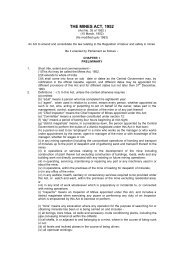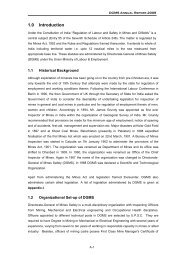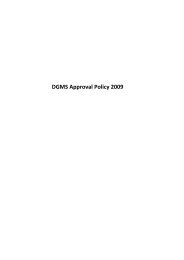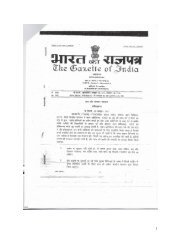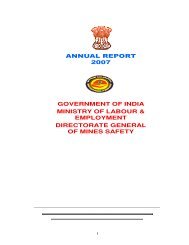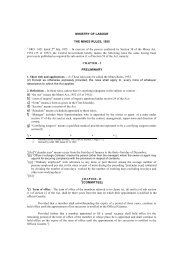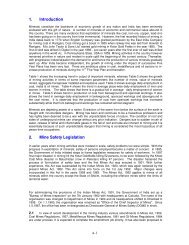India - Constitution - Directorate General of Mines Safety
India - Constitution - Directorate General of Mines Safety
India - Constitution - Directorate General of Mines Safety
You also want an ePaper? Increase the reach of your titles
YUMPU automatically turns print PDFs into web optimized ePapers that Google loves.
powers with respect to any matter as the Government <strong>of</strong> <strong>India</strong>and the Government <strong>of</strong> any State may by special agreementconfer, if Parliament by law provides for the exercise <strong>of</strong> suchjurisdiction and powers by the Supreme Court.Article 139 Conferment on the Supreme Court <strong>of</strong> powers toissue certain writsParliament may by law confer on the Supreme Court power toissue directions, orders or writs, including writs in the nature <strong>of</strong>habeas corpus, mandamus, prohibition, quo warranto andcertiorari, or any <strong>of</strong> them, for any purposes other than thosementioned in clause (2) <strong>of</strong> article 32.Article 139A Transfer <strong>of</strong> certain cases(1) Where cases involving the same or substantially the samequestions <strong>of</strong> law are pending before the Supreme Court andone or more High Courts or before two or more High Courtsand the Supreme Court is satisfied on its own motion or on anapplication made by the Attorney-<strong>General</strong> <strong>of</strong> <strong>India</strong> or by a partyto any such case that such questions are substantial questions<strong>of</strong> general importance, the Supreme Court may withdraw thecase or cases pending before the High Court <strong>of</strong> the High Courtsand dispose <strong>of</strong> all the cases itself:Provided that the Supreme Court may after determining thesaid questions <strong>of</strong> law return any case so withdrawn togetherwith a copy <strong>of</strong> its judgment on such questions to the High Courtfrom which the case has been withdrawn, and the High Courtshall on receipt there<strong>of</strong>, proceed to dispose <strong>of</strong> the case inconformity with such judgment.(2) The Supreme Court may, if it deems it expedient so to d<strong>of</strong>or the ends <strong>of</strong> justice, transfer any case, appeal or otherproceedings pending before any High Court to any other HighCourt.Article 140 Ancillary powers <strong>of</strong> Supreme CourtParliament may by law make provision for conferring upon theSupreme Court such supplemental powers not inconsistent withany <strong>of</strong> the provisions <strong>of</strong> this <strong>Constitution</strong> as may appear to benecessary or desirable for the purpose <strong>of</strong> enabling the Courtmore effectively to exercise the jurisdiction conferred upon it byor under this <strong>Constitution</strong>.Article 141 Law declared by Supreme Court to be binding onall courtsThe law declared by the Supreme Court shall be binding on allcourts within the territory <strong>of</strong> <strong>India</strong>.Article 142 Enforcement <strong>of</strong> decrees and orders <strong>of</strong> SupremeCourt and orders as to discovery, etc.(1) The Supreme Court in the exercise <strong>of</strong> its jurisdiction maypass such decree or make such order as is necessary for doingcomplete justice in any cause or matter pending before it, andany decree so passed or order so made shall be enforceablethroughout the territory <strong>of</strong> <strong>India</strong> in such manner as may beprescribed by or under any law made by Parliament and, untilprovision in that behalf is so made, in such manner as the





